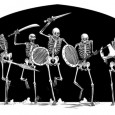Hi, welcome to the show! This week I’m reflecting on the emotional impact of a particular LARP I was in at GenCon, how to facilitate that kind of play in general, and how to port those experiences to tabletop. My guests are awesome LARPers, and other players in the game Lizzie Stark, Emily Care Boss, and Jason Morningstar.
Host: Sean Nittner
Guest: Lizzie Stark, Emily Care Boss, and Jason Morningstar
Length: 54:10
[00:27] Intro to the show
[01:30] Introduce the guests to the show
[02:20] Premise of the show, a very moving game. How did it happen?
[03:30] Always have a debrief at the end of a game. Time to discuss what people got out of the game. How it impacted them.
[07:38] Establishing buy-in and setting expectations early on.
[09:23] Transparency at the beginning of a game.
[11:07] Model that your willing to use the tools your suggesting. X Card, Cutting, Breaking.
[13:00] Start with a sharing circle. Talk about something that relates to the topic of the game. Get people comfortable with the subject matter.
[16:18] Management techniques. Raising your hand.
[17:08] Sharing an experience, doing silly things together or sharing part of yourself.
[18:51] Starting with a high-trust environment.
[21:03] Discussing physical boundaries.
[22:39] Meta-techniques: Fist Bump, Monologues, etc.
[25:51] Handling players that are not buying into the premise. How to help them engage.
[32:59] Lowering the stakes through game design.
[34:08] Debrief ideas for RPGs (Games on Demand). Other people doing debriefs.
[36:31] As a game designer, think about entry points and exit points for your games.
[37:15] Verify the players feel that their input is important and needed.
[38:06] Meta techniques allow GMs to add there enter the game and check in with players. Tools for talking about the game in the game.
[41:20] Players will get lost from game if they don’t feel valued.
[41:39] Character non-monogamy.
[44:27] Jason is running The Upgrade at Big Bad Con!
[45:10] How these techniques apply to tabletop
Direct Download: NC_Episode_077.mp3

Think you could help us find some of the games talked about here?
Sure thing, I’ll contact the guests and get you some links.
The Upgrade – http://jeepen.org/games/upgrade/
Doubt – http://jeepen.org/games/doubt/
More here: http://jeepen.org/games/
LARPing sounds intense. Emotionally and mentally. Can’t say it is my thing. Though if the opportunity arose, I would at least give it a try just to say I have done it.
The discussion about the debriefing was very interesting. I never had really given it much thought. In a way, my groups end up doing an informal debriefing after every game. We talk about what we liked, what we didn’t like, and what needs improvement. Sort of like an Agile Retrospection. However it sounds like the debriefing after a LARP touches on with feelings a lot more than the tabletop game.
I would say that as a rule, not all LARPs drive at emotions hard, but that’s what we wanted to focus on in this show. I’ve played in LARPs that were comedic, in ones that were investigative, in ones with high conflict, and in horror games, so I believe they run the whole gamut.
Your informal debrief after games sounds great though. It’s what I try to do after my games, but often don’t have time. I think it’s a really good practice.
That is a little reassuring. Still a bit skeptical but never the less willing to try it.
Maybe what you can do is have a check list to run through with each person at the end of the session. Ask them for something that went well, something that didn’t go well, and something to improve for next time. Then expand on those points if you have time and/or energy. But even that may still be too much depending on when the game ends and what kind of energy people still have left.